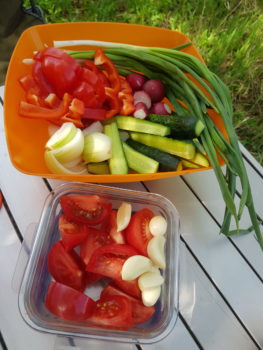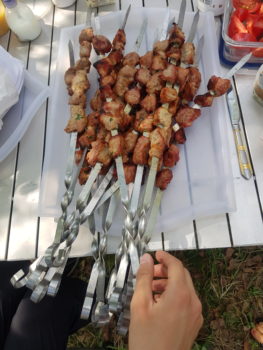The curious case(s) of shashlik Posted by bota on Aug 4, 2021 in Food, Grammar
*All images are by author
Шашлы́к и падежи́ (shashlik and cases) are quintessentially Russian things and a lot has been said about each one but always separately. What do you say if we take the best of both worlds and revise Russian cases while talking about the most perfect summer dish? That’s right, I want to have my shashlik and eat it too, or something like that.
But first, a brief guide to some of the wonderful aforementioned blogs:
What’s a Russian Picnic without Kebabs?
Падежи: Everything you ever wanted to know about Russian cases!
Now, let’s get down to business and просклоня́ем сло́во «шашлы́к» (decline the word “shashlik”) in all the six cases.
Шашлы́к — мужско́й род, еди́нственное число́ (Shashlik — masculine, singular)
| Паде́ж | Case | Question | Prepositions | Example |
|---|---|---|---|---|
| Имени́тельный | Nominative | (Кто́? Что́?) | Шашлы́к | |
| Роди́тельный | Genitive | (Кого́? Чего́?) | От, до, из, без, у, для, около, с, вокруг, после, кроме | Шашлыка́ |
| Да́тельный | Dative | (Кому́? Чему́?) | К, по | Шашлыку́ |
| Вини́тельный | Accusative | (Кого́? Что́?) | В, на, за, про, через | Шашлы́к |
| Твори́тельный | Instrumental | (Ке́м? Че́м?) | С, за, под, над, между | Шашлыко́м |
| Предло́жный | Prepositional | (О ко́м? Где? О чём?) | О, об, в, во, на, при | Шашлыке́ |
Имени́тельный паде́ж – Nominative (Кто? Что?) shows the noun in its most basic form, depending on the noun’s gender.
Шашлы́к — это не еда́, это времяпровожде́ния. [Shashlik — eto ne yeda, eto vremyaprovozhdeniya.]
Shashlik is not food, it’s a pastime.
Шашлы́к до́лжен маринова́ться всю но́чь. [Shashlik dolzhen marinovat’sya vsyu noch’.]
Shashlik has to marinate overnight.
Роди́тельный паде́ж – Genitive (Кого? Чего?) usually shows the absence of something.
Ни одна́ пое́здка на рыба́лку не обойдётся без шашлыка́. [Ni odna poyezdka na rybalku ne oboydotsya bez shashlika.]
No fishing trip will do without some shashlik!
Как пра́вильно вы́брать шампу́ры и манга́л для шашлыка́. [Kak pravil’no vybrat’ shampury i mangal dlya shashlika]
How to choose the skewers and the mangal for shashlik correctly.
Да́тельный паде́ж – Dative (Кому? Чему?) is used to refer to indirect objects in a sentence.
К шашлыку́ из ку́рицы отли́чно подхо́дят карто́фельные до́льки в йо́гуртном со́усе. [K shashliku iz kuritsy otlichno podkhodyat kartofel’nyye dol’ki v yogurtnom souse.]
Potato wedges with yogurt sauce go very well with chicken shashlik.
На́ша семья́ всегда́ покупа́ет све́жий хлеб из пека́рни к шашлыку́. [Nasha sem’ya vsegda pokupayet svezhiy khleb iz pekarni k shashliku.]
Our family always buys fresh bread from the bakery for shashlik.
Вини́тельный паде́ж – Accusative (Кого? Что?) focuses on the direct object of the verb.
Я люблю́ шашлы́к из свини́ны! [Ya lyublyu shashlik iz svininy!]
I love pork shashlik!
Заче́м ты доба́вил в шашлы́к лимо́нный сок? Он здесь совсе́м неуме́стен! [Zachem ty dobavil v shashlik limonnyy sok? On zdes’ sovsem neumesten!]
Why did you add lemon juice to shashlik? It’s doesn’t go with it at all!
Твори́тельный паде́ж – Instrumental (Кем? Чем?) uses the noun to show how an action is done.
В жару́ над шашлыко́м всегда́ лета́ют му́хи. [V zharu nad shashlikom vsegda letayut mukhi.]
Flies are always buzzing above shashlik when it’s hot outside.
Не убира́й таре́лку с шашлыко́м — мы ещё бу́дем ку́шать. [Ne ubiray tarelku s shashlikom — my yeshcho budem kushat’.]
Don’t put away the plate with shashlik — we are going to have some more.
Предло́жный паде́ж – Prepositional (О ком? Где? О чём?) usually shows the place where someone or something is located. This case is almost always paired with prepositions в [in], на [on], о [about].
Чем бли́же к ма́йским пра́здниками тем бо́льше я ду́маю о шашлыке́! [Chem blizhe k mayskim prazdnikami tem bol’she ya dumayu o shashlike!]
The closer it is to May holidays the more I think about shashlik!
В э́том шашлыке́ сли́шком мно́го у́ксуса. Мне ка́жется ты переборщи́л с марина́дом.[V etom shashlike slishkom mnogo uksusa. Mne kazhetsya ty pereborshchil s marinadom.]
This shashlik has too much vinegar. I think you overdid it with the marinade.

Build vocabulary, practice pronunciation, and more with Transparent Language Online. Available anytime, anywhere, on any device.








